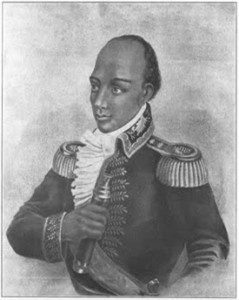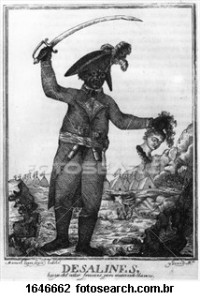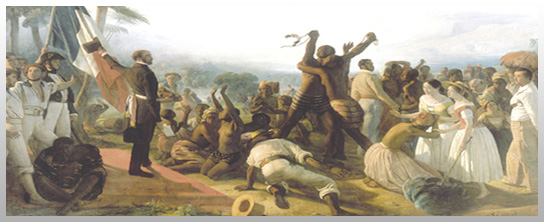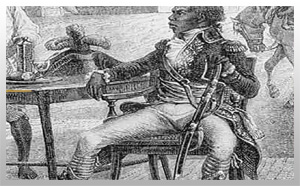 Toussaint was born in former French colony of Santa Domingo (Haïti) between 1743 and 1747. He was the symbol of freedom in Americas and played a main part in Haïti’s independence. He was emancipated by his master and distinguished himself as a private Jena, a well-considered class of household servants at the time. He worked until his 35th birthday for Earl Noa, Breda family.
Toussaint was born in former French colony of Santa Domingo (Haïti) between 1743 and 1747. He was the symbol of freedom in Americas and played a main part in Haïti’s independence. He was emancipated by his master and distinguished himself as a private Jena, a well-considered class of household servants at the time. He worked until his 35th birthday for Earl Noa, Breda family.
Toussaint went to school with his godfather, Teacher Pierre Baptiste, who taught him general knowledge and help him to improve his French. His learning was made richer thanks to his inquiring mind and his interest for books about revolutionary streams which were blossoming in Europe at that period. He lived amongst pacific burguesy, until his 40t birthday, when uprising slaves aroused his talent for leadership. Diseases brought by Europeans and the persecution of Natives in Santo Domingo caused the total extermination of indigenous people.
Black people from Africa were brought in mass to work on the island, in camps, mines and farms. A cruel and restless human exploitation which deprived them of all kinds of freedom.
In 1791, Santo Domingo was in a great quietness period, with a white population of 30000 free men and mulattos, and 40500 slaves. But the population showed discontent with the labor system and inequities between social classes, which provoked troubles in the society. Toussaint enrolled himself in the rebellion Guerrera de Boston.
A military formation, directed by a black leader, struggled against French colonization, helped by Spanish people and equipped with weapons and munitions. Attacks consisted in destroying the settlements, and putting fire to plantations and houses, turning everything into ashes. Toussaint was proclaimed lieutenant colonel. At the time of French Revolution, the National Constitution presented Human Rights and emancipation of slaves. This led Toussaint to enroll in the French army, at the head of 4000 disciplined men, to push the British out of Santo Domingo. That triggered a war in whole Europe.

Toussaint, who was General of Brigade, was promoted Chief General of the French Army. Thanks to diplomacy and weapons, he vanquished the British who were attacking the island. Toussaint was known as the West Indian Spartacus. He disciplined his army in a European perspective, always keeping his troops’ commandment. With his organized arsenals et munitions, struggling at the Spanish people’s side, he dominated the French as he had dominated the British. His military abilities, his quickness and the ability of his maneuvers, brought him the nickname of Napoleon of the Caribbean.
Toussaint was a restless leader. He funded a resistance based on economy, he consolidated and protected the plantations, created schools, hospitals etc… The readings, knowledge he had developed in the past, and the herbal treatments he knew, made him not only a brave warrior but also a doctor at the head of the revolutionary unity. In 1801, he sent a letter asking for the promulgation of a Constitution recognized by 10 members, aiming to create a sovereign nation.
France recognized Santo Domingo as a part of its Empire. The colonists took advantage on special laws resulting of the Brumaire 18th putsch. In 1795, Spain gave the eastern part of the island to France, but that had not been put in application. Toussaint was victorious over his opponents and dominated the island with 25000 men. His greatness was awesome and challenged Napoleon Bonaparte. Napoleon, anxious and suspicious, sent on the island an army of 2000 veterans under the leadership of Leclerc, his brother, and husband of Paula Bonaparte. Toussaint, disgusted, rebelled against the colonists, struggling at the side of his brothers, for freedom.

On February 6th 1802, Leclerc disembarked on the island, and defeated all resistance of Toussaint and his allies. He left behind destroyed houses, machines and plantations, razing almost everything on the island. On May 5th of the same year, Toussaint was forced to sign a Peace Treaty proposed by France. He retired of his functions and gave up his cause. He was made prisoner on June 10thof 1802 and was transferred in France as a war prisoner. He received bad treatments in jail, in cold and dirty prison cells. He died on April 7th1803.
The General Toussaint was at the origin of the first step towards Black people emancipation, until Haïti’s independence, which has been celebrated on January 1st 1804. It was the first country of Saxon America to emancipate and to become free. Toussaint challenged the great Napoleon Bonaparte. The humble slave of Breda is considered as the greatest captain of contemporary history of struggle against colonization.




